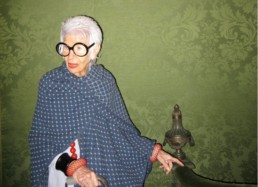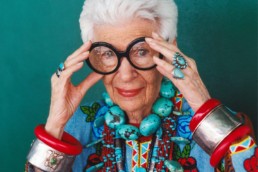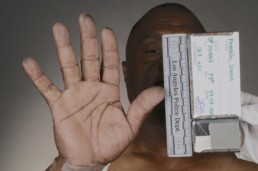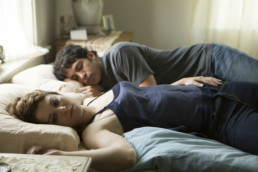Review: 'Iris'
To say that Iris Apfel has fans is an understatement. Iris Apfel has worshipers, and the Albert Maysles-directed documentary Iris proves that honest artistic expression in any form makes for a happy and fulfilled life, and one dazzling watch.
As a 93-year-old fashion icon known worldwide, Apfel exudes a naturalness in the film that makes you feel like you know her. Her body is fragile, her clothes are flamboyant, and her soul is, above all else, happy. Maysles, whose previous films include Grey Gardens and Gimme Shelter, takes audiences into Apfel's life behind the scenes. From her private apartment in New York that she shares with her 100-year-old husband Carl, to her storage warehouse that doubles as a closet, we embark on an 80-minute journey that finds inspiration–and words of wisdom from Iris herself–at every turn.
Dubbed a "Rare Bird of Fashion" and "Geriatric Starlet," Iris is instantly recognizable by any fashion-savvy onlooker today. As the recent cover girl of MAC Cosmetics, she is used to having her picture taken by everyone from bloggers and Bill Cunningham alike, but it wasn't always that way. Growing up in a middle-class Queens neighborhood during the Great Depression, Iris learned the notion hard work at a young age. As a girl working at the department store Loehmann's, Iris recalls a time when the owner, Mrs.Loehmann, called to her. "You're not pretty. You'll never be pretty," she tells Iris bluntly, "You've got something better. You have style." To this day, that remains one of the best compliments she has ever received. "Those who are the most fortunate are interesting rather than pretty as looks fade," says Iris. It is evident throughout the film that she is one of the lucky ones, as her wittiness and looks only get better with age.
Mocking her own old age, she leaves us with this style tip: "If you hang around long enough everything comes back in style." Well Iris, baby, you never left.
Forever 21, Topshop, and H&M are the death of individuality when it comes to the future of the fashion world. Mass production limits the creative mind of the consumer, as many forgo the unique vintage treasures in exchange for mass conformity and accessibility, but not Iris. Her clothing and accessories come from all over the world– every trinket and bauble has a story. Her early job as a fabric manufacturer took her all around the globe, even dressing the interior of the White House. The stories Iris and her husband recall about those times are both hysterical and sentimental, and without even trying the Apfel's give all of us a relationship to strive for.
88-year-old director Albert Maysles, who passed away last month, humanizes Iris in a way that only her close friends and family would have seen. Her guard is down as she talks candidly to Maysles about her health problems, her decision to not have children, and her fears. He captures this vulnerability with a gentleness of a best friend and the eye of an artist.
To read our interview with Iris and the producers of the film, click here.
Behind those iconic bottle-rimmed glasses is a woman who has lived life to the fullest, and serves as an inspiration to everyone who watches the film. Although, for those who could care less about the fashion industry, it may be hard to see past the spectacle and find the deeper meaning in the film. While its target audience is a niche group of people, those who take a chance on Iris will definitely not leave the theater disappointed.
The funny thing is, there is nothing particularly revolutionary or groundbreaking about Iris Apfel. She did not reinvent the wheel. She did, however, prove that confidence and individuality is priceless and we should all embrace and cater to our deepest desires in life. To say that Iris left me inspired is an understatement, not only did I rediscover the clothes in the back of my closet that I had once thought were too "outlandish," but I also gained a new perspective on living life. Iris never cared what others thought about her and that strong feminine attitude, mixed with her spunkiness, is a fantastic role model for both those in and out of the fashion world. Mocking her own old age, she leaves us with this style tip: "If you hang around long enough everything comes back in style." Well Iris, baby, you never left.
Iris opens in Los Angeles Theaters (Cinefamily, Laemmle’s Royal, Laemmle’s Playhouse 7, Westpark 8 Cinemas) Friday, May 1st.
https://www.youtube.com/watch?v=eIG2AoiHszY
Iris Apfel and Producers on 'Iris'
Her iconic look has been seen in the pages of fashion magazines for decades, yet when Iris Apfel appears in person, it still feels otherworldly. By way of wheelchair, 93-year-old Apfel still does not disappoint when it comes to her eclectic appearance. In her signature black coke rimmed glasses, she dons a multi-colored tribal inspired jacket, black chunky bracelets, and beautiful draping necklaces (plural, of course). Sitting next to her at today's press day taking place at the Four Seasons Hotel are the producers of the film Iris, Laura Coxson and Jennifer Ash Rudick. After promoting the film and answering questions all morning, I'm not surprised to hear that she is completely exhausted from the junket. But Iris is a trooper, and for twenty minutes, a few lucky journalists are able to sit down with her and talk about her life, her initial hesitations in agreeing to do the film, and her spirit animal. We begin:
How exciting is it to have a film made about you and your views on life?
Iris Apfel: I guess it's exciting... haha. I'm very grateful and I'm excited that it's being so well received. I'm so happy that it happened that way for Albert. He's gone off to heaven but he did love the film. He loved making it and I loved working with him.
How did this project start? What was your first reaction to this movie?
Iris Apfel: I said no. Jennifer [Rudick] started the whole thing.
Laura Coxson: I had been at Maysles and Jennifer sent us an email and we set up a meeting and that's when the spark started. I don't know if Iris was completely on board, I could tell there was a palpable energy between the two of them, there was a feeling of camaraderie just from that initial meeting.
Jennifer Ash Rudick: I think like most people, Iris was hesitant thinking, 'What story do I have to tell?' People seem to know her from her pictures, and Iris is just so exceptional and normal at the same time, just like all of us. Albert [Maysles, director who passed away in February 2015] wants to humanize everyone and I think it was just so clear to everybody that Al would be the perfect person to humanize Iris because she is a public figure, yet she's very private. I think she could trust Al. It's hard to do an honest portrait that isn't a pat or puff piece, and no one walks the line like Al.
Laura Coxson: I think after meeting Albert you'd be hard-pressed to say 'No" to him. There was immediate empathy and I can't tell you how many people I met with him on different projects. He really has... had an energy that was hard to deny.
 (Albert Maysles and Iris Apfel, Courtesy of L.A. Times)
(Albert Maysles and Iris Apfel, Courtesy of L.A. Times)
What about working with these lovely ladies [Coxson and Rudick]?
Iris Apfel: Well that goes without saying.
What inspired me was your self-confidence. Have you always had that confidence?
Iris Apfel: I guess I've always had it, but now it's more so.
Iris, you've been described as a "Rare bird of fashion," what would you say is your spirit animal?
Laura Coxson: I would say the tiger in the Met show, there's an outfit that Iris designed– it's a hand-woven fabric– and it's beautiful. There's a tiger in the shot of this woman wearing this coat but that tiger, every time I see the film, it reminds me of Iris.
Iris Apfel: I think maybe some shaggy old dog.
Laughter
Jennifer Ash Rudick: I wouldn't say a unicorn, but that's all I can think of. Iris loves fantasy, but she is really grounded in reality too.
Iris Apfel: I've always had a problem because my middle has been stretched, my head's in the clouds and my feet are on the ground. That's how I've always been. I'm very practical. I love fantasy and all that, but I'm very pragmatic.
What is your motivation to continue to push yourself?
Iris Apfel: I just like to experience different things and if a project comes along that I think I can learn something from, I'll do it.
 (Iris Apfel for MAC, Courtesy of l'étoile Magazine)
(Iris Apfel for MAC, Courtesy of l'étoile Magazine)
I have to ask, what is your skin regime to keep looking so beautiful?
Iris Apfel: Beautiful? Oh God, I looked in the mirror today and I screamed.
Laughter
Then the makeup lady had the gall to come with a magnifying mirror. I don't do anything, it's terrible. I should, but I don't. People send me all of these products and I did an collection for MAC and they sent me everything you can think of, but they're still in the boxes. I don't have time for that. I just wash my face. I use Cetaphil from the drugstore. I only wear makeup when I'm going on camera. I shine too much without it so they slap some on.
What advice do you have for young girls who want to be like you?
Iris Apfel: I think they have to learn on their own. Learn what they can tolerate and what they can handle, and not just follow what people tell them to do. You can't do your own thing unless you have a thing to do, so they have to develop and learn something. Be yourself is the most important thing, don't live in somebody else's image.
How was the filming process?
Iris Apfel: I was completely bound by these people over here [Points to producers].
Laura Coxson: It was a sporadic schedule, not to be the boring person at the table, but figuring out the right shoots that made sense with our budget were not easy. Albert's whole style is to film things as their happening, so sometimes if we couldn't get something that was happening, like the Met show that already happened, maybe we get Iris talking about it and also Harold [Koda, Curator in charge of The Costume Institute at The Metropolitan Museum of Art] talking about it.
Jennifer Ash Rudick: Iris was very kind and let us in on her schedule, and as time went on there were more intimate shoots in her apartment and of course that is the more, at least to me anyway, the more interesting parts. As the subject she didn't really know where things were going, so she'd ask, 'Why do you want to come to my house and watch me make soup?' or something. She put a lot of faith in the process.
 (Carl and Iris Apfel in their condo in Palm Beach, Florida, Courtesy of Palm Beach Daily News)
(Carl and Iris Apfel in their condo in Palm Beach, Florida, Courtesy of Palm Beach Daily News)
Was your husband Carl always on board to be in the film?
Iris Apfel: He's a ham at heart so yeah.
Laughter
Laura Coxson: There really was a kinship between Carl and Albert. When we had the opportunity to be filming with him, even just from a sightline level, they'd both be sitting near each other talking. There's a lot of great footage of that.
Do you follow trends?
Iris Apfel: I don't give a damn about any trends, it's pointless. Trends come and go and I don't think they matter. If a trend suits you it's good, otherwise who needs it. Forget about it. Keep what looks good on you and what you're happy wearing. I can't stand these columns, "The Ten Things You Must Have." Why?
What is Iris going to be doing next?
Iris Apfel: I book coming out, I have to get to work on that. A bag line. I'm so tired, I can't remember.
Iris is in select theaters Friday, May 1st.
Review: 'Girl on the Edge'
Girl on the Edge is based on a true story about a teenage girl's encounter with a traumatic event, and learning to accept herself for who she is while struggling to escape her demons. Hannah Green (Taylor Spreitler) is 15-years-old and already counts alcohol, marijuana, and social media as addictions. After a wild night out finds her in bed with 18-year-old Tommy (Shane Miller), Hannah is shocked to learn that what she believed was a shared act of love was a one-sided manipulation for sex and is further devastated when nude pictures of her are posted online. Hannah quickly sinks into a depression, one her dad (Gil Bellows) and stepmother (Amy Price-Francis) think can be cured at a holistic rehabilitation center called "Maheo" that treats troubled teens. Director Jay Silverman's drama has all of the makings of a dark story, but with the overuse of melodramatic vignettes and formulaic script, Girl on the Edge may only resonate with younger generations.
Once at the treatment center, Hannah takes on the role of the rebel. She breaks the rules, has an attitude, and avoids compassion from her counselors Hank (Peter Coyote), Esther (Elizabeth Peña), and Ariel (Amy Davidson). The one thing that catches her attention, albeit not immediately, is a horse named Besty. Esther explains that horses are like mirrors, they feed off of behavior and personality, and the progress she makes during treatment at Maheo will be reflected in her relationship with the horse. There are many a montage that show Hannah learning to deal with the responsibility of taking care of a horse, and as expected, she eventually concludes her time at treatment with a newly-adjusted attitude towards herself and the ones she loves.
The edgy, mysterious and dark thread that weaves throughout Blue Valentine has been replaced with a short, shiny beige thread here.
The problem with this story is the pacing, as Hannah's troubles evolve extremely quickly– within 20 minutes of the film we are already on the way to rehab. Hannah's life spirals so quickly, we are pulled along without stopping to develop or understand who Hannah really is. It's a very rushed first act that, if allowed more time to organically evolve, would have been more effective to an audience who is supposed to sympathize with her situation.
The story is extremely formulaic and its outcome is predictable within the first few minutes of watching, so no surprises here. What is surprising, however, is that Girl on the Edge has the same screenwriter as Blue Valentine. Joey Curtis threw me for a loop with this film since it is so different from his work on Valentine that upon realizing the connection, I would have never thought these two films were related in any way. The edgy, mysterious and dark thread that weaves throughout Blue Valentine has been replaced with a short, shiny beige thread here. I say shiny because this is a story of hope, and overall the cast succeeds in opening up a dialogue after the film about the importance of self-worth and mental health. Taylor Spreitler definitely has a naturalness about her that makes her presence onscreen very appealing. The late Elizabeth Peña as Esther gives a warm but firm performance.
Overall, the film is missing a certain fluidity. A rushed first act combined with an over-abundance of folksy-backed, angst-filled montages throw the balance of the film off. The structure seems geared toward a younger generation with a shorter attention span. However, being based on a true story, it was a nice addition at the end of the film to show the real Hannah running alongside her horse. While she didn't say anything, her movements and the way she carried herself was that of a strong, confident and happy girl. I'm sure all of us can relate in one way or another to Hannah and her struggles with self-acceptance, and hopefully films like Girl on the Edge will make it easier for those who need help to reach out and seek it.
Girl on the Edge screened April 27.
https://www.youtube.com/watch?v=gb18HJ4sol4
Review: 'The Search For Freedom'
"If you love what you're doing it ain't work, it's fun" - Warren Miller, Ski Filmmaker
Watching The Search For Freedom is like taking a vacation in your seat; we travel to vast and beautiful ocean shores, to gigantic snowy mountain tops, and even to giant rock boulders surrounded by dirt. Director Jon Long takes us to these places because that is where the subjects of his documentary – all professional or legendary figures in the world of action sports – find their happiness and purpose in life. It is here, in a barrel of a wave, kayaking off of a waterfall, or even free-falling from thousands of feet in the air, where they experience freedom. Aside from the mesmerizing footage and mind blowing athletics displayed here, the film sets out to answer one very simple question: What does freedom mean to you?
It's clear from the subjects in the documentary that the pursuit of freedom is equal to the pursuit of happiness. This happiness is found by living in the moment, focusing on the now and the power of the unknown. The basic nature of every human being is the search for freedom, and Long gathers a Who's Who of an ensemble cast that share insight into their respective sport, and demonstrate how they pursue it. Some of the cast includes skateboarders Tony Hawk and Danny Way, snowboarder Annie Boulanger, surfer Kelly Slater, rock climber Ron Kauk and ER doctor/ base jumper Glenn Singleman, to name a few. All of the interviews are passionate and from the heart, making for an inspiring and motivating watch.
Every other minute seems to be another epic montage that never fails to send chills down your spine and bring a smile to your face.
Aside from the athletes, The Endless Summer director Bruce Brown is interviewed, along with Quicksilver co-founder Bob McKnight and Patagonia founder Yvon Chouinard. While they may not be as much of a "fear seeker" as the others, these men are responsible for taking the phenomenon of extreme sports and creating its attainability for the mainstream, which lead to the beginning of the lifestyle culture as we know it today. Long does an excellent job of compiling these engaging interviews and breathtaking footage to show how these activities are both fun and a way of life.
The Search For Freedom plays very linear and doesn't stray from its thesis statement of "What is Freedom." While visually arresting and undoubtedly beautiful, there is not much in the way of storytelling. We are really just looking at a photographic montage with inspirational quotes. Not to say this is a bad thing, you really do not have to invest any brain power into understanding what is on screen and so you can truly just sit back and relax. An anthemic soundtrack gives the film an extra boost of power.
The setting for this screening, here at the Newport Beach Film Festival, truly could not be better. Every other minute seems to be another epic montage that never fails to send chills down your spine and bring a smile to your face. Jon Long and his cast prove that their passions are not just a sport, they are a way of life, and regardless if we're a professional or an amateur, pursuing our passion and finding our freedom will lead us down the road to happiness.
The Search For Freedom had its world premiere April 24, with a planned theatrical release June 10th.
https://vimeo.com/121174641
Review: 'Tales of the Grim Sleeper'
If a poverty-stricken African-American woman – a prostitute – is murdered in South Central Los Angeles, and the case is overlooked by the LAPD because of her "lifestyle," does her death matter?
At the disturbing core of Nick Broomfield's documentary Tales of the Grim Sleeper, this appropriated age-old, "If a tree falls in the woods" paradox is examined in all too real circumstances.
In July 2010, a man suspected of murdering over 100 women over a 25-year span was arrested, and shockingly, by accident. His name is Lonnie Franklin Jr., and his arrest happened to be a mere coincidence for police officers, who matched his DNA to 20 possible victims on a piece of trash he threw away (while investigating another unrelated case). Despite the staggering number of murders in the infamous crime-ridden city, the police never gave this serial murder mystery much thought, much less a made it a priority. Today, Broomfield goes to South Central to talk to those who went overlooked by police, and to find out more about this man gravely nicknamed the "Grim Sleeper."
Tales of the Grim Sleeper comes off of the uphill swing of many popular true-crime episodic today. This new wave of American entertainment finds its home at HBO, whose shows include "The Jinx," "True Detective," and the greatest television show in history*, "The Wire." This American Life's latest golden ticket, "Serial," is a podcast that tried to get to the bottom of a case that found Adnan Syed guilty of murdering his ex-girlfriend Hae Min Lee, despite a lack of any physical evidence. Just this April 20th, Serial became the first ever podcast to win a Peabody Award. Having an audience already fine-tuned to, and oddly enthusiastic about, real-life stories of murder and mystery, Broomfield presents a story so surreal it sounds like a horror film.
Having an audience already fine tuned to, and oddly enthusiastic about, real-life stories of murder and mystery, Broomfield presents a story so surreal it sounds like a horror film.
Friends of Lonnie's line the streets near his once lived-in home and this is where Broomfield starts his journey into the "Grim Sleeper's" world. Asking Lonnie's friends personal questions, we are painted a picture of a man who was philandering and a bit "weird," but nevertheless a seemingly good father and neighbor. When police raided his home and finally put the cuffs on his wrists, some were shocked, but mostly everyone sighed in relief, including Pam Brooks.
Pam becomes Broomfield's tour guide for the city, transforming into unofficial journalist by fielding questions for Broomfield, who she feared would get shot for his being a white man with a camera asking questions. Brooks is a firecracker; an ex-prostitute and crack addict, she is now four years sober. While on the streets she had an intimate encounter with Lonnie that she almost never escaped from. Her previous experience with him is the catalyst for her help in this film.
For those unfamiliar with Broomfield's filmmaking approach, it is quite unconventional in its DIY-style. For instance, he uses Google Maps to illustrate places as opposed to a more visually pleasing, modern looking interactive map. He carries the sound equipment on his chest and the boom mic in his hand, with another crew member serving as his cameraman. It is reminiscent of a college-budget student film, which at times can be distracting, as the guerrilla camerawork lends to his inserting of himself into every scene, sometimes unnecessarily. The film at times becomes more about Broomfield and his "fish out of water" situation than on the actual subjects. But on the other hand, this style is extremely personal; he establishes direct connections with the people and in the area which he roams.
Lonnie himself never speaks in the film, as he is currently behind bars awaiting a trial date. The stories, or tales, told in the film build him up to be this mythical creature, so an interview with him would have given the film more balance and stability. Theories run rampant throughout the community, questioning the possibility of crooked police officers contributing to the deaths, and covering it up by adding them to the Grim Sleeper's total. Another theory is that Lonnie's son had something to do with the incidents. More investigative journalism on Broomfield's part could have explored these different avenues and either uncovered or, put to rest, these claims. Instead, we are left wondering what to make of the grand accusations presented, and then glossed over just as quickly as they came.
Under the helm of a different director, Tales of the Grim Sleeper would have been a different film, and arguably to better results. Contrary to popular takeaway, I would trade Broomfield's casual interview style for a harder hitting investigative approach. The interviews he conducts are mostly assumptions or educated guesses about the life of Lonnie Franklin Jr. It's hard to find credibility in the What Ifs. The end of the film hits the hardest as survivors of the attacks finally speak, finally giving us some sort of concrete evidence. Tales of the Grim Sleeper is so outlandish, shocking, and culturally relevant that of course it's going to drop a few jaws, but the ever scarier afterthought is how these murders went unaccounted for, for so long. Now that is truly haunting.
*Not a proven fact, although this reviewer begs to find a show any better.
Tales of the Grim Sleeper premieres on HBO on Monday, April 27th.
https://www.youtube.com/watch?v=3Gh2dOxMAvM
Top 10 Best Earth Day Films on Netflix
Happy Earth Day! While we should be celebrating this holiday 365 days a year, April 22nd marks a day when we come together to say one collective "We Love You" to our planet. We've sifted through thousands of films on Netflix to come up with the top 10 best Earth Day movies to watch today, tomorrow, and any other time you feel like appreciating Mother Nature.
Tracks (2013)
Based on a true story, Robyn Davidson (Mia Wasikowska) travels 1,700-miles across the deserts of West Australia alone, with only her camels and dog as company.
Directed by John Curran, Tracks also stars Adam Driver.
Blackfish (2013)
This award-winning documentary is a mesmerizing look at the controversial captivity of killer whales, and how its affects are deadly to both whales and humans.
Directed by Gabriela Cowperthwaite, the film features Sea World's infamous killer whale Tilikum.
Cast Away (2000)
One of Tom Hanks most memorable roles, Cast Away is a classic that finds Chuck Noland (Hanks) stuck on an island doing everything he can to survive.
Directed by Robert Zemeckis, the film also stars Helen Hunt and "Wilsoooon!"
Force Majeure (2014)
This drama takes place during a family's ski trip in the French Alps, whose relationship is put to the test when they suddenly find themselves staring down an avalanche.
Directed by Ruben Östlund, this film was also nominated for a Golden Globe last year.
Virunga (2014)
A Netflix original documentary, a group of soldiers from the Congo risk their lives to save the last of the world's mountain gorillas.
Directed by Orlando von Einsiedel, Virguna is Executive Produced by Leonardo DiCaprio.
Waste Land (2010)
On the outskirts of the world's largest landfill in Rio de Janeiro, garbage pickers collect trash and make beautiful works of art.
Directed by Lucy Walker, Karen Harley, and João Jardim, the film also features contemporary artist Vik Muniz.
Chinatown (1974)
Los Angeles is the backdrop to this classic mystery noir film as a private detective who is hired to expose an adulterer, becomes involved in a downward spiral of corruption, deceit and murder..
Directed by Roman Polanski, the film also stars Jack Nicholson and Faye Dunaway.
Prince Avalanche (2013)
Two highway workers spend the summer of 1988 away from their lives in the city and embrace the the isolation of the empty road.
Directed by David Gordon Green, the film also stars Emile Hirsch and Paul Rudd.
Maidentrip (2013)
If you're looking for an inspirational documentary, this is it; 14-year-old Laura Dekker completes a solo two-year voyage around the world.
Directed by Jillian Schlesinger, Maidentrip uses footage Dekker shot herself at sea.
Vanishing of the Bees (2009)
This film looks at the current- and crucial- situation of the disappearing honeybee, and how it is affecting the economy and our ecology.
Directed by Maryam Henein and George Langworthy, the film is narrated by actress Ellen Page.
Review: 'The Road Within'
Showcasing at last year's Los Angeles Film Festival comes The Road Within, a melodramatic story about three young adults struggling with psychological disorders who embark on a road trip in a bid to forget the past and embrace the mystery of the future. This coming of age film comes from writer/director Gren Wells, whose previous screenwriting credits include the Kate Hudson starring A Little Bit of Heaven. What the script itself lacks in emotional investment and uniqueness is made up for in captivating performances, giving this the little-indie-that-could a small shot at success outside of the festival circuit.
Vincent (Robert Sheehan) has Tourette's syndrome, and as a result, uncontrollably blurts out curse words and experiences involuntary bodily movements. After the death of his mother, Vincent's father Robert (Robert Patrick) admits him into an experimental psychiatric hospital, where he meets his OCD centric roommate Alex (Dev Patel) and Marie (Zoë Kravitz), who is battling anorexia. Spontaneously, after a day (or two) after Vincent's admission, they decide to break out of the clinic and steal the car of their therapist, Dr. Rose (Kyra Sedgwick), and the merry band of misfits head West, with nothing but the clothes on their backs and their issues in full force.
We're not anticipating the story as much as we are observing the character's flaws, and the actors themselves.
It's not long until Dr. Rose and Robert are on the trail, and a mild game of cat and mouse ensues. Literally a day later, Dr. Rose and Robert happen to randomly find the escapees in the middle of the forest. A fast thinking plan distracts the duo long enough for the group to speed off to California. While on the road, all three disorders collide like a car crash reminiscent of The Three Stooges; there is yelling, cursing, and general law-breaking, yet the story unfolds at a snail's pace. Of course, it's during this time that Vincent and Marie become close, and Alex confronts his issues head on. But even these pivotal plot moments seem dull in comparison to the chaos in the car.
The story is tepid at best; we know where the film is headed from the very beginning. We're not anticipating the story as much as we are observing the character's flaws, and the actors themselves. Sheehan is extremely convincing as both a Tourettes sufferer and American, both of which he is not in real life. His British accent is completely masked by his unparalleled impersonations of various tics and mannerisms. If it were anyone else playing the part of Vincent, this would have been a completely different movie and not in a good way. Zoë plays Marie with a tough exterior but knows when to let the emotion through. Struggling with anorexia when she was younger, she talks about her uncomfortable experience dropping down to 90 lbs to play the part in Nylon, which is definitely worth the read. Of all the performances, however, it is Dev Patel that steals the screen as "clean freak" Alex. He is on the receiving end of taunting from Marie constantly, but through all of his mundane routines, his solemn heart shines through and makes him undeniably likable. Of all of the roles Patel has taken, Alex may be his biggest emotional one to date.
If you're interested in a film for character study, The Road Within is a good start. Tourette's Syndrome, like other disorders, is one of the biggest challenges an actor can tackle because is both and internal and external battle. All three actors find the line between realistic and overboard and carefully execute a performance worth a watch. If you're looking for an inspiring road trip movie about a group of friends experiencing life's highs and lows, this is not it, however, its desire to be a sentimental film does deserve a nod of approval.
The Road Within opens at Laemmle Theaters today.
https://www.youtube.com/watch?v=ZEA0LfvcpFw
Review: 'Alex of Venice'
Chris Messina may be better known as Danny Castellano on "The Mindy Project," or from his feature film roles in Argo, Vicky Cristina Barcelona. He may even be recognized as Dianna Agron's cheating husband in the Sam Smith music video, "I'm Not The Only One." With an impressive resume so far, Messina now adds to it the title of director, in Alex of Venice, his debut film that is every bit as quietly commanding as the title sounds.
On a foggy Southern California morning, surfers wade in the ocean looking like seals, and hundreds of tourists pack the commercial Venice Beach boardwalk. But in the quiet suburbs of the beach town, Alex (Mary Elizabeth Winstead) sets out to change the world – or rather, keep the world exactly as it is without it changing any further.
Alex is an environment lawyer whose mission is to preserve the city's natural habitats. Yet the nature of the job, coupled with her extreme drive and work ethic, leaves little time for family. What can only be described as years of frustration later, her artist/surfing husband (Messina) reveals that he can no longer be a "Stay at home housewife" to her career and wants a break. Blindsided by the sudden change, Alex is left alone, which although scary at first, ultimately becomes an opportunity to re-discover who she is and find peace with the person she has become.
As the proverbial glue holding her family together, Winstead gives another powerful and soulful performance that we can now expect from any film with her name in it.
At its core, Alex of Venice is all about the actors. The script is simple enough to execute on an indie budget, but what really makes the film stand out rests in the hands of the characters and fortunately, the is no weak link here. Mary Elizabeth Winstead in the title role is becoming a name synonymous with exceptional, grounded and powerful performances, and she is no different as she pushes this small indie film to highly buzzed about levels.
The film's most notable supporting character is Don Johnson, who plays Alex's father, an aging actor who's early onset Alzheimer's causes him to grapple daily. Johnson brings an exceptional performance to the screen, seeing him struggle with his lines to Chekov's "The Cherry Orchard," in which he has been cast as the lead role, is extremely moving.
As the proverbial glue holding her family together, Winstead gives another powerful and soulful performance that we can now expect from any film with her name in it. Her humor comes from the presumably off-script impromptu actions and nuances of her character against the stresses of a life-changing work case, an ailing father, and dependent ten-year-old son. Her attitude and now forced responsibilities as a working single mother is contrary to the Venice beach lifestyle, her workaholic nature is juxtaposed in a city of free-spirited artists.
In keeping with the easy-breezy nature of the film, music contributions from the Los Angeles band Poolside, self-described as "daytime disco," along with Alexander Ebert's "A Million Years" to close the film, are summations of the film's blissful and sentimental vibe.
Messina has a clear vision for Alex of Venice, all of his experience on set as an actor has made his transition behind the camera seem easy and natural. Long camera takes dominate the early scenes, giving the impression of fluidity and ease. While the script has some unresolved story lines and overall, isn't very strong in its linear story, it is the cast that makes it work.
Give in to your suspension of disbelief for this one. Taking out a few curse words and unnecessary sexual language could have seen this film with a PG-13 rating as opposed to R, which the film is, and would most likely have given the film a larger platform, and seem more appealing to the audience at large. Flaws aside, Messina should be proud of his debut film.
Alex of Venice opens at the Laemmle Royal Theatre on Friday.
https://www.youtube.com/watch?v=I0_JydvJ9-I


















